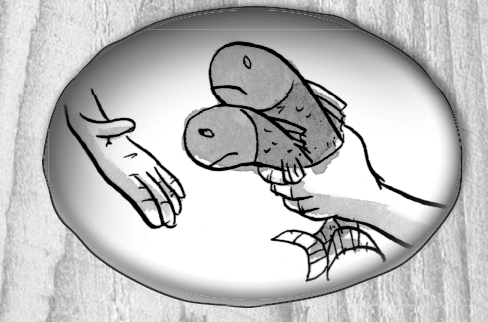
Able, the entrepreneur, seems to have a bright future. But what about the rest of the island? Haven't we just created a caste system of the have and have-nots? Will Baker and Charlie suffer because of Able's success? Not likely. Although it was never his intention to benefit anyone other than himself, Able's capital helps everyone nevertheless. Let's see how.
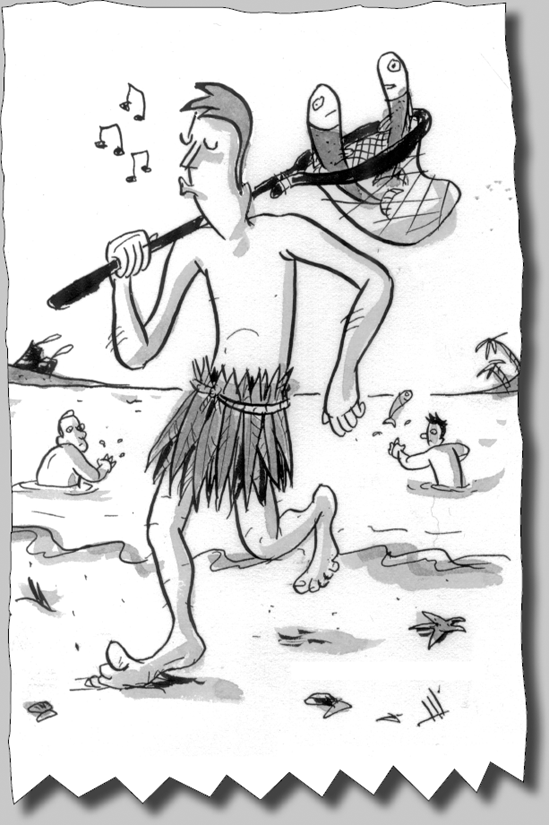
After witnessing the ease with which Able now catches his fish, Baker and Charlie asked him to share his innovative fish catcher.
"Hey, Able," said Charlie, "since you use that thingy only every other day, how about you let me use it the day you're out doing other stuff?"
"C'mon, share the wealth, buddy," added Baker.
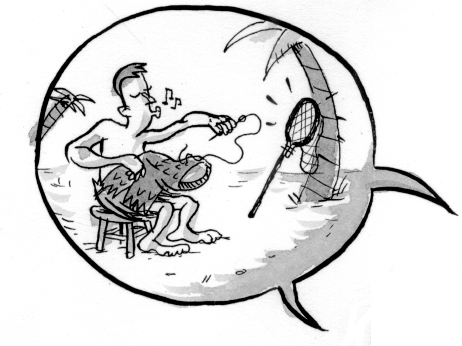
But Able didn't just fall off the tuna truck yesterday. He remembers his self-sacrifice ... he remembered their scorn, and he thought of the risk. "What if they break my net? What if they just don't give it back? Then it's back to square one for me. So long, designer leafwear!"
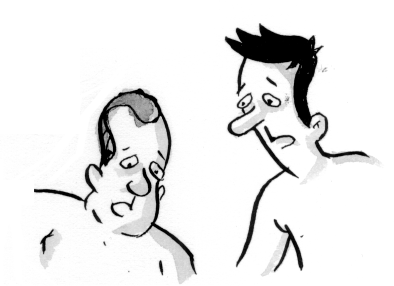
With all this downside, Able turned them down. "Sorry, guys, no can do. I made my own net, so can you. At least you guys know that the thing works!"
Although Charlie saw the efficiency of using a net, he was apprehensive about the prospect of building one for himself.
He responded to Able, "How do I know if I'll get it right? I've never made one of those things before, and besides I don't do well with hunger. I get the shakes. I might starve to death before I make a decent net!"
Baker stepped forward with another proposal. "Okay tightwad, so you're not gonna do us any favors. We get it. But how about this? Lend us some of your surplus fish to eat while we make our own nets. That way we won't starve as we build, and we'll repay every fish we borrow from you from the extra fish we catch!"
Although the idea appealed to Able more than giving away his net, he was still very skeptical. "But if I lend you my fish, I have no guarantee that you won't just lie on the beach and take the day off! Even if you build your own nets, they may not even work. Either way, you'll never be able to repay me, and I would have lost my savings for nothing! You gotta do better than that."
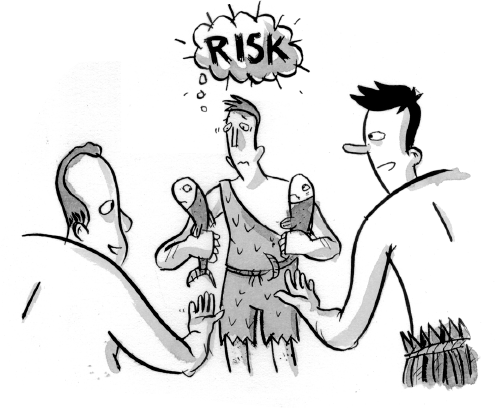
Charlie and Baker conceded the point. They realized that they were asking Able to take a risk for no personal benefit. But the lure of extra fish was too strong. Before long they came up with a way to entice him into taking a chance.
They thought, they crunched the numbers, and finally a financial idea was born!
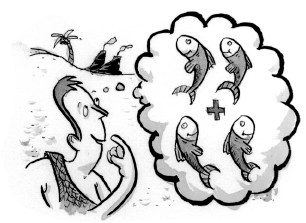
Baker approached Able and said, "Let's make a deal: For every fish you lend us, we'll pay you back two. That's a 100 percent profit. Where else are you gonna get a return like that on an island like this?"
Able is persuaded, "Now that interests me!" he said with no apparent irony.
Able thought of the riches, "If I lend them two fish I'll get back four." I'll be two fish richer without doing any work. I'll be a fish tycoon!"
To some it may appear that Able has crossed a line. If this were a Hollywood movie he would start twirling his waxed mustache. He would be making money off the backs of others' labor, drawing profits from their toil!
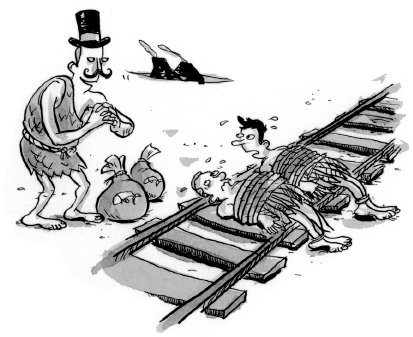
But that image doesn't hold water. Even if Able intends only to fill his own fish coffers, his greed, for lack of a better word, would provide a benefit that would have otherwise been unavailable.
It's important to note that Able does not need to make the loan.
He has other options, including these four:
He simply might hold on to his fish for future use....This is the most secure option. He would be guaranteed to not have any losses, but of course his savings wouldn't grow.
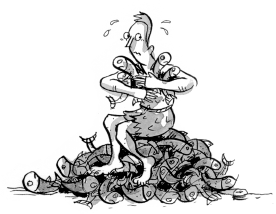
He could simply indulge himself and consume his savings.
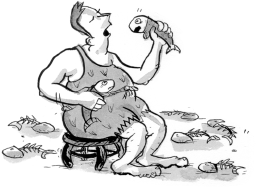
He could build his own net rental company. He reckoned that if he consumed one of his reserve fish a day for two days, he could build two more nets.
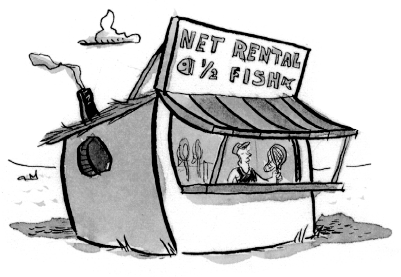
He could then rent the extra nets to Baker and Charlie for half of a fish each day. With each of the two kicking in half of a fish every day to his net rental company, Able would have the one fish a day he needs to live, without ever having to go fishing himself. Hello, early retirement!
In this scenario, Baker and Charlie would be able to catch two fish per day with their new nets. After paying Able their half fish rent per day, they would still have one and a half fish per day each. That's 50 percent more than they would have had with no nets. It's a win-win.
Although intriguing, Able noticed some flaws in his logic. Baker and Charlie might rent the nets for two days...then use their savings to build nets for themselves. In such a scenario he would be only two fish ahead...that's a real risk!
He could lend out his two fish to Baker and Charlie and charge them 100 percent interest. In this scenario, he'd get four fish back if they paid him back in full with interest. But, there was always a risk that they'd stiff him.
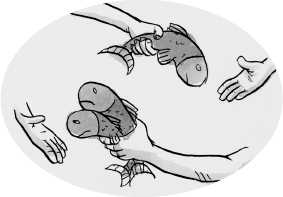
Decisions...decisions...decisions!
To summarize, Able (and society) can do only five things with savings:
He can save what he has saved.
He can consume what he has saved.
He can lend out what he has saved.
He can invest what he has saved.
He can try a combination of the other four options.
Unquestionably, Able's ultimate decision will be based on his own desire for risk and reward. But whatever he does, he is benefiting the island economy and is imposing no burdens on his neighbors.
In the end, Able decides to make the loan.
To some it may appear that Able used his advantage to exploit his needy neighbors. And while it's true that he made a profit without working, it doesn't mean he gets something for nothing. Able's profit is his compensation for the risks he takes. What's more, his ability to profit doesn't hinder the advancement of his peers.
Because of Able's desire to make a profit from his savings, Baker and Charlie got the opportunity to build nets without having to under consume. If they succeed, they will have improved their economic futures without having to go hungry. The rest will be gravy... or more accurately, fish oil. At that point, they themselves will have excess capital. If they fail, and are unable to pay back the loan, it's Able who takes the loss.
Essentially, the lender can benefit only if the borrower benefits.
Of course, others may not see the mutual benefits as clearly. What if, upon seeing Able's sudden expansion of wealth, Baker and Charlie grew envious and demanded a portion of his savings?
Imagine this alternative scenario:
Baker fretted, "Look at that guy lording it over us with his fancy palm-leaf tuxedo, while we sweat it out in the waves every day wrangling slimy fish. Hasn't that guy ever heard of charity? Couldn't he just spare me a fish or two so I could take a day off once in a while? He's got so many fish piling up, he'd never even know one was gone."
Charlie concurred, "Share the wealth, elitist!"
Or, what about this scenario:
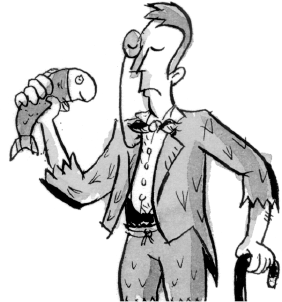
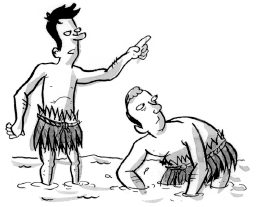
Let's suppose Able, feeling somewhat guilty about his comparative wealth, was swayed by their arguments and gave away his fish, asking for nothing in return. What would Baker and Charlie do with the extra fish?
If they were free from the burden of repayment, they would most likely use the gift to increase their leisure time. And while there is nothing inherently wrong with leisure (in fact, it is the goal of most human activity), Baker and Charlie's vacation would not increase the island's productive capacity by a herring. And so while the charity option sounds more magnanimous, and may improve Able's popularity, it doesn't provide the economic boost that a business loan would.
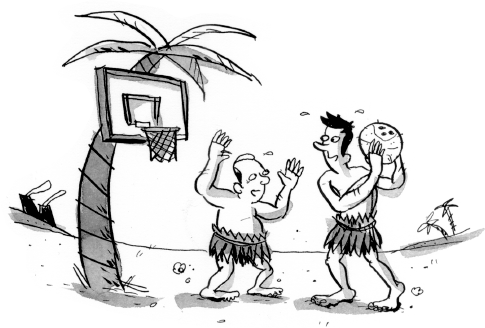
The bottom line is that anything that leads to more fish catching (production) benefits the island. The more fish there are, the more possibilities there are for everybody to eat more, do something besides fishing, or perhaps, do nothing at all.
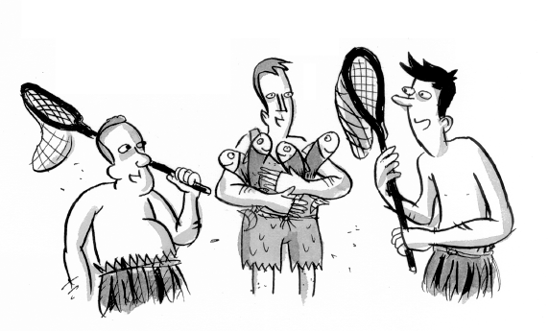
Wealth is always a relative term. In a primitive society where little is produced, even the richest can't match the material well-being available to the poor of an industrialized economy. In the Middle Ages, even the mightiest kings lacked the basic amenities that nearly everyone in the United States now takes for granted... things like central heating, indoor plumbing, and fresh vegetables in the winter. And although Baker and Charlie would imagine that a two-fish-per-day diet was the height of luxury, from our perspective such a lifestyle hardly seems enviable.
But the fact that there are degrees of wealth has always struck some as being inherently unfair. Central in this unease is the belief that the rich become that way because they take wealth from others, thereby creating the poor. In modern economics, some have even labeled this idea "the labor theory of value," which states that profit is created by paying workers less than they are worth. In this view, entrepreneurs, like Able or giant corporations for that matter, can get rich only if they succeed in making others poor.
This idea has everything to do with moral posturing, and nothing to do with reality. The reason that the rich get that way (at least initially) is that they offer something of value to others. Able offers loans to those who have inadequate savings. If he profits, it's only because the service he provides is valuable to others.
If Able were a big bully and could simply steal half of his neighbors' catch every day, then it would be true that his relative wealth would be derived from the relative poverty of those he oppresses. But these actions, which would involve forcing others to do something against their own interests, would not increase the island's overall productive capacity. He would simply take what others have produced, and the island's production would remain the same. More likely, overall capacity would fall. The oppressed would cut back on their work when they realized the fruits of their labor would be stolen.
Large-scale examples of such coercion dominate history. Slavery, serfdom, and peasantry all come to mind. And while workers do respond to force when their self-interest is denied, they respond far better if they are the beneficiaries of their labor.
Unfortunately, examples of large-scale economic freedom are rare in global history. But when self-interest is allowed to flourish, productive capacity expands quickly.
The use of credit is the perfect example of how economic freedom works to everyone's benefit. As long as lenders and borrowers are free to strike their own terms, the collective results will be a success. However, as we will see later on, the market for loans can be distorted by outside forces. When it is, disaster usually ensues.
